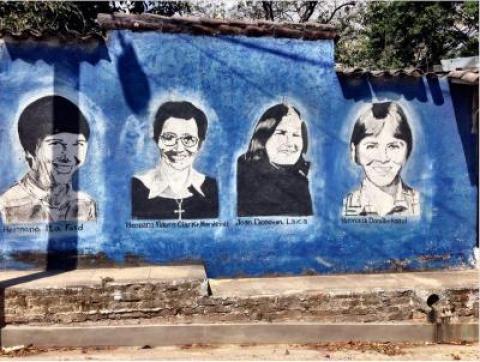
Maryknoll Father Tom Henehan reflects on growing in consciousness of Divine Love and our salvation amid fear and despair.
As I write this homily I have very present in my mind the four church women (Maryknoll Sisters Ita Ford and Maura Clarke, Ursuline Sister Dorothy Kazel and Lay Missioner Jean Donovan) who were murdered in El Salvador on this date in 1980. I was very close to Ita Ford while we worked in Chile and was with her the night she left Chile in April 1980 to travel to El Salvador at the request of Monsignor Oscar Romero.
Violence of poverty
Living and working among the poor for more than forty years in Guatemala, Chile and Bolivia, I have witnessed daily the violence of poverty. I now live on the South side of Chicago, a city marked by daily murders where recently six people were shot outside my back window. Two died…violence has no borders!
As I reflect on the readings of this first Sunday of Advent I cannot ignore the violence that millions of people suffer around the world as victims of war or victims of poverty that cause so many to flee their country looking for asylum and safety. In Laudato Si’, Pope Francis says that the greatest challenge today amid this reality of violence is the “globalization of indifference.” We block out what is happening in the world and ignore our responsibility as fellow members of the human family.
In this context the Word is made Flesh.
In the first reading, Jeremiah alerts us that the time is coming when God’s promise will be fulfilled, when righteousness and justice will prevail and the people will live in safety. At this historical moment mindfulness, being alert, being conscious of the moment, is key to being in communion with this promise. “To be serenely present to each reality, however small it may be, opens us to much greater horizons of understanding and personal fulfillment.” (Laudato Si’, 222)
In the second reading, Paul tells the Thessalonians that the love for each other reflects the love God has for all; and that love is our strength and the way to holiness.
We cannot separate God (love) from our reality.
The command is to love the other and our self as God loves us. Such utterly free and gratuitous love is the only love that validates, transforms, and changes us at the deepest levels of consciousness.
In the gospel reading, Luke writes that in the midst of fear and despair our salvation is near. To be an agent of that salvation (missionary disciple of Jesus) we are called to be on watch, to be on alert and pray for the strength to move forward to the safety and freedom of the Divine presence. The key to salvation is being conscious of the power within each to be in communion with Jesus Christ and His teachings.
The readings are a wake-up call.
We are challenged to be aware of what is happening and grow in being conscious of our responsibility for what is happening and consciously mirror the gratuitous love of God.
Our consciousness is what distinguishes us from all of creation. No other creature has the spiritual gift of consciousness. We can dream, we can visualize the emerging future, we can have a spiritual life, we can write poetry, we can love and be loved. That is unique to humans. Through today’s readings God challenges us to develop that spiritual gift of being mindful of God in our daily lives and in the lives of others and respond to violence. The transformation has to start with a change of heart and living out what we preach. “The first and irreplaceable form of mission is the testimony of the Christian life and the model is Christ”. (Saint John Paul II in Redemptoris Mission, para. 42)
Pope Francis connects the globalization of indifference to the lack of consciousness as he addresses the violent reality that is marked by despair and fear. “We need to strengthen our consciousness that we are one family. There are no borders nor political or social barriers that permit us to be isolated and it is because of this there is no place for the globalization of indifference.” (Laudato Si’, 52)
Advent is a time to address the violence around us.
The Season of Advent is a time to develop our mindfulness, to be alert and conscious of the moment and our responsibility to commit our life to Christ by being a peacemaker. We are challenged to be conscious of Christ among us, I was hungry and you gave me to eat… What we are waiting for (the birth of our Savior) is already here!
